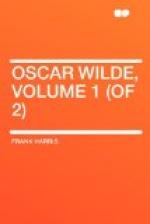They were all, however, conceived and written from the standpoint of the artist, and the artist alone, who never takes account of ethics, but uses right and wrong indifferently as colours of his palette. “The Decay of Lying” seemed to the ordinary, matter-of-fact Englishman a cynical plea in defence of mendacity. To the majority of readers, “Pen, Pencil and Poison” was hardly more than a shameful attempt to condone cold-blooded murder. The very articles which grounded his fame as a writer, helped to injure his standing and repute.
In 1889 he published a paper which did him even more damage by appearing to justify the peculiar rumours about his private life. He held the opinion, which was universal at that time, that Shakespeare had been abnormally vicious. He believed with the majority of critics that Lord William Herbert was addressed in the first series of Sonnets; but his fine sensibility or, if you will, his peculiar temperament, led him to question whether Thorpe’s dedication to “Mr. W.H.” could have been addressed to Lord William Herbert. He preferred the old hypothesis that the dedication was addressed to a young actor named Mr. William Hughes, a supposition which is supported by a well-known sonnet. He set forth this idea with much circumstance and considerable ingenuity in an article which he sent to me for publication in The Fortnightly Review. The theme was scabrous; but his treatment of it was scrupulously reserved and adroit and I saw no offence in the paper, and to tell the truth, no great ability in his handling of the subject.[9]
He had talked over the article with me while he was writing it, and I told him that I thought the whole theory completely mistaken. Shakespeare was as sensual as one could well be; but there was no evidence of abnormal vice; indeed, all the evidence seemed to me to be against this universal belief. The assumption that the dedication was addressed to Lord William Herbert I had found it difficult to accept, at first; the wording of it is not only ambiguous but familiar. If I assumed that “Mr. W.H.” was meant for Lord William Herbert, it was only because that seemed the easiest way out of the maze. In fine, I pointed out to Oscar that his theory had very little that was new in it, and more that was untrue, and advised him not to publish the paper. My conviction that Shakespeare was not abnormally vicious, and that the first series of Sonnets proved snobbishness and toadying and not corrupt passion, seemed to Oscar the very madness of partisanship.
He smiled away my arguments, and sent his paper to the Fortnightly office when I happened to be abroad. Much to my chagrin, my assistant rejected it rudely, whereupon Oscar sent it to Blackwoods, who published it in their magazine. It set everyone talking and arguing. To judge by the discussion it created, the wind of hatred and of praise it caused, one would have thought that the paper was a masterpiece, though in truth it was nothing out of the common. Had it been written by anybody else it would have passed unnoticed. But already Oscar Wilde had a prodigious notoriety, and all his sayings and doings were eagerly canvassed from one end of society to the other.




